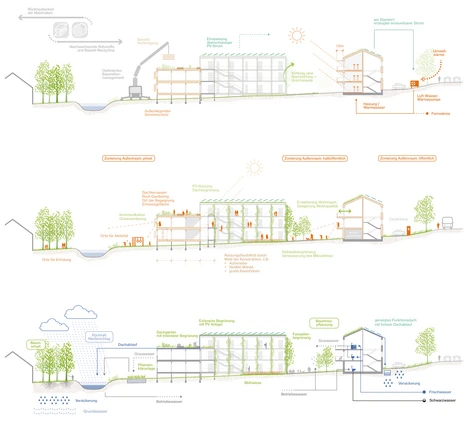ECO+: Toward positive environmental impacts of neighborhoods
The research project “ECO+: Toward positive environmental impacts of neighborhoods” has been successfully completed, and the final research report has been published on MediaTUM.
The project aimed to develop and apply strategies for building with positive environmental impacts within the framework of affordable housing developments. Using a real-world planning case, the project investigated how urban districts can be designed and implemented with a holistic approach that considers not only ecological but also social and economic factors. As a result, two key tools were developed: the ECO+ Design Tool and the ECO+ Criteria Catalogue, covering the action fields of Society, Energy, Material, Green, Water, and Mobility.
The ECO+ Design Tool supports the early planning phases by helping to define a coherent strategy for the development and implementation of environmentally positive neighborhoods. The ECO+ Criteria Catalogue enables honest and objective evaluation of planning outcomes and helps assess the extent to which defined goals have been achieved.
Within the project, GTLA was responsible for the action fields Green and Water.
The research project was led by the Chair of Energy Efficient and Sustainable Design and Building at TUM (Technical University of Munich), in collaboration with the Chair of Design and Construction – Sustainable Buildingat Bochum University of Applied Sciences and the project partner Öko Bau GmbH. It was funded by the German Federal Environmental Foundation (DBU) and the Bavarian Building Industry Foundation.
The resulting research outputs are available for download:
- Final Research Report: https://doi.org/10.14459/2025md1783467
- ECO+ Design Tool: https://doi.org/10.14459/2025md1783462
- ECO+ Criteria Catalogue: https://doi.org/10.14459/2025md1783465
- ECO+ Case Study: https://doi.org/10.14459/2025md1783466
Researchers
Dr. Friederike Well, Christoph Fleckenstein, Prof. Dr. Ferdinand Ludwig
Project duration
01.10.2022 – 30.09.2024
Funding organization
The German Federal Environmental Foundation (Deutsche Bundesstiftung Umwelt DBU)
Stiftung Bayerisches Baugewerbe
Project partners
Technical University of Munich, Chair of Energy Efficient and Sustainable Design and Building
Technical University of Munich, Professorship for Green Technologies in Landscape Architecture
TU Dortmund University, Junior professorship in Resource-Efficient Construction
Öko Bau GmbH
